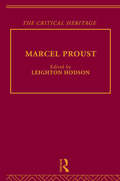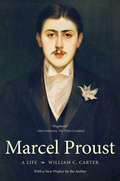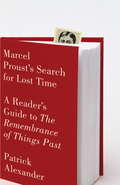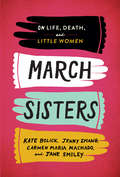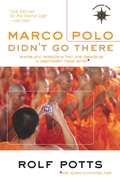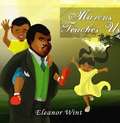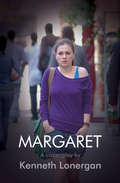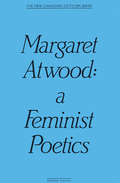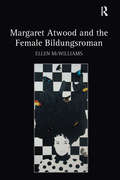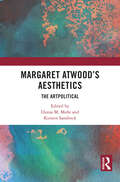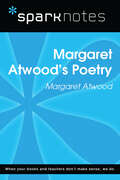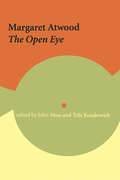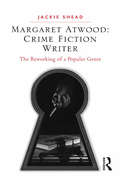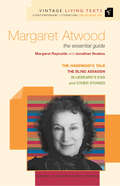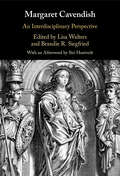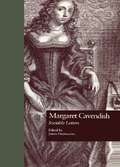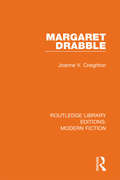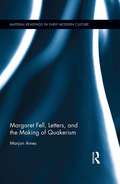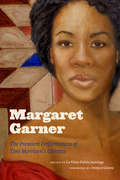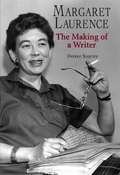- Table View
- List View
Marcel Proust
by Leighton HodsonThis set comprises 40 volumes covering 19th and 20th century European and American authors. These volumes will be available as a complete set, mini boxed sets (by theme) or as individual volumes. This second set compliments the first 68 volume set of Critical Heritage published by Routledge in October 1995.
Marcel Proust
by William C. CarterThis outstanding biography portrays in abundant detail the life and extraordinary times of Marcel Proust, one of the greatest literary voiced of the twentieth century. Based on a wealth of letters, memoirs, workbooks, and manuscripts unavailable before, the book examines Proust's character and development as an artist, the glittering Parisian world of which he was a part, and the passions that enabled him to write his masterpiece, In Search of Lost Time. Book jacket.
Marcel Proust in Context
by Adam WattThis volume sets Marcel Proust s masterwork, A la recherche du temps perdu (In Search of Lost Time, 1913 27), in its cultural and socio-historical contexts. Essays by the leading scholars in the field attend to Proust s biography, his huge correspondence, and the genesis and protracted evolution of his masterpiece. Light is cast on Proust s relation to thinkers and artists of his time, and to those of the great French and European traditions of which he is now so centrally a part. There is vivid exploration of Proust s reading; his attitudes towards contemporary social and political issues; his relation to journalism, religion, sexuality, science and travel, and how these figure in the Recherche. The volume closes with a comprehensive survey of Proust s critical reception, from reviews during his lifetime to the present day, including assessments of Proust in translation and the broader assimilation of his work into twentieth- and twenty-first-century culture.
Marcel Proust's Search for Lost Time: A Reader's Guide to The Remembrance of Things Past
by Patrick AlexanderAn accessible, irreverent guide to one of the most admired--and entertaining--novels of the past century. There is no other guide like this; a user-friendly and enticing entry into the marvelously enjoyable world of Proust.<P><P>At seven volumes, three thousand pages, and more than four hundred characters, as well as a towering reputation as a literary classic, Proust's novel can seem daunting. But though begun a century ago, in 1909, it is in fact as engaging and relevant to our times as ever. Patrick Alexander is passionate about Proust's genius and appeal--he calls the work "outrageously bawdy and extremely funny"--and in his guide he makes it more accessible to the general reader through detailed plot summaries, historical and cultural background, a guide to the fifty most important characters, maps, family trees, illustrations, and a brief biography of Proust. Essential for readers and book groups currently reading Proust and who want help keeping track of the huge cast and intricate plot, this Reader's Guide is also a wonderful introduction for students and new readers and a memory-refresher for long-time fans.
March Sisters: A Library of America Special Publication
by Jane Smiley Kate Bolick Jenny Zhang Carmen Maria MachadoOn its 150th anniversary, four acclaimed authors offer personal reflections on their lifelong engagement with Louisa May Alcott's classic novel of girlhood and growing up.For the 150th anniversary of the publication of Louisa May Alcott's Little Women, Kate Bolick, Jenny Zhang, Carmen Maria Machado, and Jane Smiley explore their strong lifelong personal engagement with Alcott's novel--what it has meant to them and why it still matters. Each takes as her subject one of the four March sisters, reflecting on their stories and what they have to teach us about life. Kate Bolick finds parallels in oldest sister Meg's brush with glamour at the Moffats' ball and her own complicated relationship with clothes. Jenny Zhang confesses to liking Jo least among the sisters when she first read the novel as a girl, uncomfortable in finding so much of herself in a character she feared was too unfeminine. Carmen Maria Machado writes about the real-life tragedy of Lizzie Alcott, the inspiration for third sister Beth, and the horror story that can result from not being the author of your own life's narrative. And Jane Smiley rehabilitates the reputation of youngest sister Amy, whom she sees as a modern feminist role model for those of us who are, well, not like the fiery Jo. These four voices come together to form a deep, funny, far-ranging meditation on the power of great literature to shape our lives.
Marco Polo Didn't Go There
by Rolf PottsMarco Polo Didn't Go There is a collection of rollicking travel tales from a young writer USA Today has called "Jack Kerouac for the Internet Age." For the past ten years, Rolf Potts has taken his keen postmodern travel sensibility into the far fringes of five continents for such prestigious publications as National Geographic Traveler, Salon.com, and The New York Times Magazine. This book documents his boldest, funniest, and most revealing journeys-from getting stranded without water in the Libyan desert, to crashing the set of a Leonardo DiCaprio movie in Thailand, to learning the secrets of Tantric sex in a dubious Indian ashram.Marco Polo Didn't Go There is more than just an entertaining journey into fascinating corners of the world. The book is a unique window into travel writing, with each chapter containing a "commentary track"-endnotes that reveal the ragged edges behind the experience and creation of each tale. Offbeat and insightful, this book is an engrossing read for students of travel writing as well as armchair wanderers.
Marco Polo and the Encounter of East and West
by Suzanne Conklin Akbari Amilcare IannucciFew figures from history evoke such vivid Orientalist associations as Marco Polo, the Venetian merchant, explorer, and writer whose accounts of the "Far East" sparked literary and cultural imaginations. The essays in Marco Polo and the Encounter of East and West challenge what many scholars perceived to be an opposition of "East" and "West" in Polo's writings. These writers argue that Marco Polo's experiences along the Silk Road should instead be considered a fertile interaction of cultural exchange. The volume begins with detailed studies of Marco Polo's narrative in its many medieval forms (including French, Italian, and Latin versions). They place the text in its material and generic contexts, and situate Marco Polo's account within the conventions of travel literature and manuscript illumination. Other essays consider the appropriation of Marco Polo's narrative in adaptations, translation, and cinematic art. The concluding section presents historiographic and poetic accounts of the place of Marco Polo in the context of a global world literature. By considering the production and reception of The Travels, this collection lays the groundwork for new histories of world literature written from the perspective of cultural, economic, and linguistic exchange, rather than conquest and conflict.
Marcus Teaches Us
by Eleanor Wint<p>Marcus Teaches Us is the first and only book of its kind. It portrays the teachings of The Hon. Marcus Mosiah Garvey in language and pictures that all kids will love. It is bright with innovative colouring activities, uses simple language and gives children the opportunity to practice cursive writing. Marcus Garvey is a monumental, internationally acclaimed Black philosopher who has influenced the independence movement of every black nation in the world. Children worldwide should each have their own copy as they deserve to have the knowledge captured in this attractive book on Marcus Garvey.</p> <P><P><i>Advisory: Bookshare has learned that this book offers only partial accessibility. We have kept it in the collection because it is useful for some of our members. To explore further access options with us, please contact us through the Book Quality link. Benetech is actively working on projects to improve accessibility issues such as these.</i>
Margaret (Books That Changed the World)
by Kenneth LonerganThe director&’s-cut screenplay of the film starring Anna Paquin from the Oscar-winning writer and director of Manchester by the Sea. This stirring drama by the Academy Award–winning director, playwright, and screenwriter Kenneth Lonergan was called &“a film of rare beauty and shocking gravity&” by Rolling Stone. Delayed for four years in post-production, the film was finally released in 2011, with a director&’s cut following on DVD in 2012. This edition includes the scripts of the full director&’s cut, along with an introduction and key tie-in art. Margaret is the story of a Manhattan teenager whose life is profoundly altered after witnessing a terrible accident. It is the extraordinary journey of an emotional teen who abides by her moral code and wants to set things right, but whose innocent ideals come crashing against the harsh realities of the adult world. It is a story of youth, love, the consequences of mistakes, and the fundamental questions of morality as faced by a teenager in an extraordinary situation. &“A triumph . . . the sort of ambitious American storytelling you find too rarely at the movies.&” —Chicago Tribune &“Extraordinarily ambitious . . . Lonergan has as much on his mind as a contemporary novelist such as Don DeLillo or Jonathan Franzen.&”—Time &“Arguably the most important American playwright of the last twenty years.&” —The New York Times
Margaret Atwood
by Frank DaveyMargaret Atwood's writing, according to Davey, reveals not only an extraordinary facility with language, but also a deep mistrust of it as something shaped by an instrumental and largely male culture. Her language directs its readers to a hidden level of itself - unspoken, symbolic, gestural - and away from denotative meaning.
Margaret Atwood and the Female Bildungsroman
by Ellen McWilliamsExamining Margaret Atwood's work in the context of the complex history of the Bildungsroman, Ellen McWilliams explores how the genre has been appropriated by women writers in the second half of the twentieth century. She demonstrates that Atwood's early work - her own 'coming of age' fiction, including unpublished works as well as The Edible Woman, Surfacing, and Lady Oracle - both engages with and works against the paradigms of identity which are traditionally associated with the genre. Making extensive use of unpublished manuscripts in the Atwood Collection at the University of Toronto, McWilliams uncovers influences that shaped Atwood's fashioning of identity in her early novels, paying particular attention to Atwood's preoccupation with survival as a key symbol of Canadian literature, culture, and identity. She also considers the genre's afterlife on display in Cat's Eye, The Robber Bride, Alias Grace, The Blind Assassin, and Moral Disorder, in which the formulations of selfhood and identity in Atwood's early fiction are revisited and developed. Atwood emerges as a writer who self-consciously invokes and then undercuts the traditions of the Bildungsroman, a turn that may be read as a means of at once interrogating and perpetuating the form. McWilliams's book furthers our understanding of subjectivity in Atwood's fiction and contributes to ongoing conversations about the role gender and cultural contexts play in reframing generic boundaries.
Margaret Atwood and the Labour of Literary Celebrity
by Lorraine YorkFor every famous author there is a score of individuals working behind the scenes to promote and maintain her celebrity status. This timely and thoughtful book considers the particular case of internationally renowned writer Margaret Atwood and the active agents working in concert with her, including her assistants and office staff, her publicists, her literary agents, and her editors. Lorraine York explores the ways in which the careers of famous writers are managed and maintained and the extent to which literary celebrity creates a constant tension in these writers' lives between the need of solitude for creative purposes and the give-and-take of the business of being a writer of significant public stature.Making extensive use of unpublished material in the Margaret Atwood Papers at the University of Toronto, York demonstrates the extent to which celebrity writers must embrace and protect themselves from the demands of the literary world, including by participating in - or even inventing - new forms of technology that facilitate communication from a slight remove. This informative study calls overdue attention to the ways in which literary celebrity is the result not only of a writer's creativity and hard work, but also of an ongoing collaborative effort among professionals to help maintain the writer's place in the public eye.
Margaret Atwood's Aesthetics: The Artpolitical
by Dunja M. Mohr and Kirsten SandrockPerhaps more timely than ever, Margaret Atwood’s Aesthetics offers novel perspectives on both contemporary and canonical topics in Margaret Atwood’s work with a special focus on the intersections of literature and politics. Arguably one of the most political writers of our times, Atwood’s oeuvre subtly and overtly entangles readers in the dialectics of personal and political power asymmetries intrinsic to her aesthetic practices. The collection takes its cue from the concept of the ‘artpolitical’ as coined by Crispin Sartwell, whose afterword addresses Atwood’s aesthetic and imaginative material world-construction and explores the interrelationship between literatures and aesthetic as well as political systems in Atwood’s works. Individual chapters of Margaret Atwood’s Aesthetics contribute to increasingly burning questions concerning the relevance of literature today by drawing on a variety of critical perspectives, including Anthropocene studies, gender, intersectionality, the nonhuman and the posthuman, Mikhail Bakhtin’s carnivalesque, risk studies, nationhood, intermediality, and teaching. Chapters offer fresh views on some of Atwood’s most prominent works, such as The Handmaid’s Tale and The Testaments and their transmedial adaptations, while other chapters focus on Atwood’s latest publications as well as on under-researched works, including her graphic novels and her web-serialized publications. Margaret Atwood’s Aesthetics provides unique insights into the aesthetic and political power of Atwood’s oeuvre, arguing that literary and media representations and cultural adaptation practices contain a significant transformative potential that reaches beyond the page.
Margaret Atwood's Poetry (SparkNotes Literature Guide Series)
by SparkNotesMargaret Atwood's Poetry (SparkNotes Literature Guide) by Margaret Atwood Making the reading experience fun! Created by Harvard students for students everywhere, SparkNotes is a new breed of study guide: smarter, better, faster. Geared to what today's students need to know, SparkNotes provides: *Chapter-by-chapter analysis *Explanations of key themes, motifs, and symbols *A review quiz and essay topicsLively and accessible, these guides are perfect for late-night studying and writing papers
Margaret Atwood: The Open Eye (Reappraisals: Canadian Writers)
by John Moss and Tobi KozakewichMargaret Atwood enjoys a unique prominence in Canadian letters. With over thirty books to her credit, in genres ranging from children's writing to dystopic novels, she is as creatively diverse as she is internationally acclaimed. Her success, however, has been double-edged: the very popularity that makes her such a prominent figure in the literary world also renders her vulnerable to claims of being a "sell-out," as she relates in her Empson lectures. The Open Eye negotiates the space between these positions, acknowledging Atwood's remarkable achievement while considering how it impacts on national politics and identity.The range of perspectives in this volume is stimulating and enlightening. The Open Eye begins with a focus on Atwood as she presents herself and is presented in Canada and abroad, and then proceeds to consider, more broadly, the intersection of life and literature that Atwood's works and persona effect. It offers fresh insight into Atwood's early writing, redresses the critical void regarding her poetry and shorter prose pieces, and provides a critical base from which readers can assess Atwood's most recent novels.A common thread throughout these essays is the recognition of Atwood's importance in the literary realm in general, and in Canadian literature more particularly.
Margaret Atwood: The Reworking of a Popular Genre
by Jackie SheadExploring how Margaret Atwood’s fiction reimagines the figure of the detective and the nature of crime, Jackie Shead shows how the author radically reworks the crime fiction genre. Shead focuses on Surfacing, Bodily Harm, Alias Grace, The Blind Assassin, Oryx and Crake and selected short fiction, showing the ways in which Atwood’s protagonists are confronted by their own collusion in hegemonic assumptions and thus are motivated to investigate and expose crimes of gender, class and colonialism. Shead begins with a discussion of how Atwood’s treatment of crime fiction’s generic elements, particularly those of the whodunit, clue puzzle and spy thriller, departs from convention. Through discussion of Atwood’s metafictive strategies, Shead also examines Atwood’s techniques for activating her readers as investigators who are offered an educative process parallel to that experienced by some of the author’s protagonists. This book also marks a significant intervention in an ongoing debate among Atwood critics that pits the author’s postmodernism against her ethical and humanistic concerns.
Margaret Atwood: the essential guide (Vintage Living Texts #8)
by Margaret Reynolds Jonathan NoakesIn Vintage Living Texts teachers and students will find the essential guide to the works of Margaret Atwood. This guide will deal with her themes, genre and narrative technique, and a close reading of the texts will be accompanied with likely exam questions, and contexts and comparisons - as well as providing a rich source of ideas for intelligent and inventive ways of approaching the novels.
Margaret Cavendish
by Lisa WaltersIt is often thought that the numerous contradictory perspectives in Margaret Cavendish's writings demonstrate her inability to reconcile her feminism with her conservative, royalist politics. In this book Lisa Walters challenges this view and demonstrates that Cavendish's ideas more closely resemble republican thought, and that her methodology is the foundation for subversive political, scientific and gender theories. With an interdisciplinary focus Walters closely examines Cavendish's work and its context, providing the reader with an enriched understanding of women's contribution to early modern scientific theory, political philosophy, culture and folklore. Considering also Cavendish's ideas in relation to Hobbes and Paracelsus, this volume is of great interest to scholars and students of literature, philosophy, history of ideas, political theory, gender studies and history of science.
Margaret Cavendish: An Interdisciplinary Perspective
by Lisa Walters Brandie R. SiegfriedMargaret Cavendish's prolific and wide-ranging contributions to seventeenth-century intellectual culture are impossible to contain within the discrete confines of modern academic disciplines. Paying attention to the innovative uses of genre through which she enhanced and complicated her writings both within literature and beyond, this collection addresses her oeuvre and offers the most comprehensive and multidisciplinary resource on Cavendish's works to date. The astonishing breadth of her varied intellectual achievements is reflected through elegantly arranged sections on History of Science, Philosophy, Literature, Politics and Reception, and New Directions, together with an Afterword by award-winning novelist Siri Hustvedt. The first book to cover nearly all of Cavendish's major works in a single volume, this collection brings together a variety of expert perspectives to illuminate the remarkable ideas and achievements of one of the most fascinating and prolific figures of the early modern period.
Margaret Cavendish: Sociable Letters (Garland Studies in the Renaissance)
by James FitzmauriceFirst published in 1997. Routledge is an imprint of Taylor & Francis, an informa company.
Margaret Drabble (Routledge Library Editions: Modern Fiction #12)
by Joanne V. CreightonMargaret Drabble is a writer who plays a lively role in both popular and literary culture. Widely read and studied throughout the world her novels attract both the general reader and the literary critic. Originally published in 1985, Joanne Creighton examines this phenomenon and places particular emphasis on her "Englishness", her role as a woman writing credibly about modern women and her ability to mediate between the traditional and the modern. She argues that the resonances of Drabble’s work grow put of her strong sense of the powers and resources of existing literary traditions coupled with her intelligent portrayal of the familiar problems of people in modern society, and that is precisely this mediating position which makes Drabble an important voice in contemporary fiction and links her with other writers of her generation. Challenging those critics who see Drabble as a fiction traditionalist. Creighton finds her work open-ended, inquiring, equivocal and unquestionably contemporary in spirit.
Margaret Fell, Letters, and the Making of Quakerism (Material Readings in Early Modern Culture)
by Marjon AmesIntensely persecuted during the English Interregnum, early Quakers left a detailed record of the suffering they endured for their faith. Margaret Fell, Letters, and the Making of Quakerism is the first book to connect the suffering experience with the communication network that drew the faithful together to create a new religious community. This study explores the ways in which early Quaker leaders, particularly Margaret Fell, helped shape a stable organization that allowed for the transition from movement to church to occur. Fell’s role was essential to this process because she developed and maintained the epistolary exchange that was the basis of the early religious community. Her efforts allowed for others to travel and spread the faith while she served as nucleus of the community’s communication network by determining how and where to share news. Memory of the early years of Quakerism were based on the letters Fell preserved. Marjon Ames analyzes not only how Fell’s efforts shaped the inchoate faith, but also how subsequent generations memorialized their founding members.
Margaret Garner: The Premiere Performances of Toni Morrison's Libretto
by La Vinia JenningsIn January 1856, Margaret Garner--an enslaved woman on a Kentucky plantation--ran with members of her family to the free state of Ohio. As slave catchers attempted to capture the fugitives in Cincinnati, Garner cut the throat of her two-and-a-half-year-old daughter to prevent her return to slavery. Toni Morrison first imaginatively treated Margaret Garner's infanticide in her Pulitzer Prize-winning novel Beloved (1987). In 2004, it became the subject of her libretto Margaret Garner: Opera in Two Acts, a lyrical text designed to be paired with music and sung operatically. Grammy Award-winning composer Richard Danielpour had tapped Morrison to write the libretto for his opera Margaret Garner: A New American Opera, which world premiered in Detroit in 2005. La Vinia Delois Jennings's edited volume records key events, debates, and critical assessments of Morrison's success with Garner's story as a libretto. It also includes essays by individuals who played central roles in bringing the opera to the stage and recovering Garner's story. The collection opens with a foreword by mezzo-soprano Denyce Graves, for whom Danielpour composed the title role. The other contributors range from literary and opera scholars to specialists in American slavery studies and scholars of Toni Morrison's oeuvre. Their essays position her libretto within the African American operatic and libretto tradition, a tradition not fully known to performance scholars and heretofore unexamined.
Margaret Laurence: The Making of a Writer
by Donez XiquesMargaret Laurence: The Making of a Writer is an engaging narrative that contains new and important findings about Laurence’s life and career. This biography reveals the challenges, successes, and failures of the long apprenticeship that preceded the publication of the The Stone Angel, Laurence’s first commercially successful novel. Donez Xiques demonstrates the importance of Margaret Laurence’s early work as a journalist in her development as a writer and covers her return to Canada from Africa in the late 1950s. She details the significance of Laurence’s "Vancouver years" as well as the challenges of her year in London prior to settling at Elm Cottage in Buckinghamshire, when Laurence stood on the verge of success. The Margaret Laurence known to most people is a public figure of the 1960s and 1970s; matriarchal, matronly, and accomplished. The story of her early years in the harsh setting of the Canadian Prairies during the 1930s - years of drought and the Great Depression - and of her African years has never before been chronicled with the thoroughness and vividness that Xiques provides for the reader. Appended to this powerful new biography is a short story by Margaret Laurence that has never before been published and two other stories that have not been widely available. They indicate the range of her concerns and show a marked departure from her fiction in The Tomorrow-Tamer and Other Stories and A Bird in the House. Readers will benefit from the extensive research in this full and vibrant portrait of one of the most revered writers of twentieth-century Canadian literature.
Margaret Paston’s Piety
by Joel T. RosenthalThe collection of Margaret Paston's letters and papers from fifteenth century England offeran invaluableexampleof daily life during that period. Drawing on a close reading of these personal letters, as well as Paston'swill, this book reveals how popular religion was integrated into daily life. "
